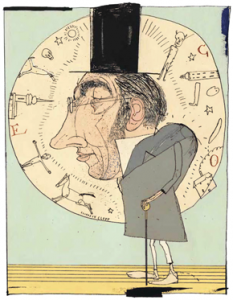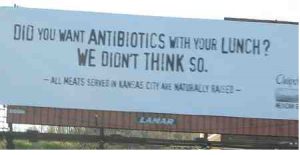Without Kierkegaard, where would Woody Allen be?
 The 200th anniversary of Soren Kierkegaard’s birth has brought some stereotypical outpourings about angst and existentialism.
The 200th anniversary of Soren Kierkegaard’s birth has brought some stereotypical outpourings about angst and existentialism.
Me, it’s better to play hockey.
I have a soft spot for the Danes. Spending five summers hammering nails with a couple of Danish homebuilders in Ontario (that’s in Canada) taught me the value of being well-read and beer at morning coffee, lunch, and afternoon coffee. My friend John Kierkegaard would say, the beer is nice, but the work, it isn’t really so good.
When I went to Copenhagen in 1998 for a scientific meeting, there was beer at morning coffee.
Gordon Marino wrote in The New York Times that the way we negotiate anxiety plays no small part in shaping our lives and character. And yet, historically speaking, the lovers of wisdom, the philosophers, have all but repressed thinking about that amorphous feeling that haunts many of us hour by hour, and day by day. The 19th-century philosopher-theologian Soren Kierkegaard stands as a striking exception to this rule. It was because of this virtuoso of the inner life that other members of the Socrates guild, such as Heidegger and Sartre, could begin to philosophize about angst.
The adytum of Kierkegaard’s understanding of anxiety is located in his work “The Concept of Anxiety” — a book at once so profound and byzantine that it seems to aim at evoking the very feeling it dissects.
Perhaps more than any other philosopher, Kierkegaard reflected on the question of how to communicate the truths that we live by — that is the truths about ethics and religion.
“Deep within every human being there still lives the anxiety over the possibility of being alone in the world, forgotten by God, overlooked among the millions and millions in this enormous household. A person keeps this anxiety at a distance by looking at the many round about who are related to him as kin and friends, but the anxiety is still there.”
Kierkegaard understood that anxiety can ignite all kinds of transgressions and maladaptive behaviors — drinking, carousing, obsessions with work, you name it. We will do most anything to steady ourselves from the dizzying feeling that can take almost anything as its object. However, Kierkegaard also believed that, “Whoever has learned to be anxious in the right way has learned the ultimate.”
 In his “Works of Love,” Kierkegaard remarks that all talk about the spirit has to be metaphorical. Sometimes anxiety is cast as a teacher, and at others, a form of surgery. The prescription in “The Concept of Anxiety” and other texts is that if we can, as the Buddhists say, “stay with the feeling” of anxiety, it will spirit away our finite concerns and educate us as to who we really are, “Then the assaults of anxiety, even though they be terrifying, will not be such that he flees from them.” According to Kierkegaard’s analysis, anxiety like nothing else brings home the lesson that I cannot look to others, to the crowd, when I want to measure my progress in becoming a full human being.
In his “Works of Love,” Kierkegaard remarks that all talk about the spirit has to be metaphorical. Sometimes anxiety is cast as a teacher, and at others, a form of surgery. The prescription in “The Concept of Anxiety” and other texts is that if we can, as the Buddhists say, “stay with the feeling” of anxiety, it will spirit away our finite concerns and educate us as to who we really are, “Then the assaults of anxiety, even though they be terrifying, will not be such that he flees from them.” According to Kierkegaard’s analysis, anxiety like nothing else brings home the lesson that I cannot look to others, to the crowd, when I want to measure my progress in becoming a full human being.
But this, of course, is not the counsel you are likely to hear these days at the mental health clinic.
I can attest to that.
So when Tyson launches a no antibiotics ever campaign, it is appealing to crass consumerism, making a buck, and throwing science back to when Kierkegaard was born.
We want our social media and technology, but we want our food produced in some 200-year-old barn.
Tyson President and CEO Tom Hayes said earlier this year that the company would continue to innovate in product development while remaining focused on sustainable production practices. “For us, sustainability isn’t a single issue; it’s about focusing on multiple dimensions in order to advance the whole,” Hayes said during the 2017 Consumer Analyst Group of New York (CAGNY) Conference in Boca Raton, Florida. “We will use our reach, capabilities and resources to drive positive change at a scale we believe no other company can match.”
Amy and I went to a Phoenix Coyotes hockey game when Wayne was coach, maybe 2006, and this loudmouth behind us was bragging about some cougar he hooked up with in Boca.
That’s your benchmark, Tyson.
I have vague memories of another company, back in 2006, that turned its back on science and proclaimed no antibiotics.
 They forgot about food safety, too busy being posers.
They forgot about food safety, too busy being posers.
How’s that working out, Chipotle?
The language of this presser is full swallow-whole.
The company’s sustainability plans include establishing strategic partnerships to set science-based sustainability goals; continuing third-party audits of farms to certify humane treatment of chickens; improving how chickens are raised through a concept farm, with innovations designed to be better for the birds, the environment and food safety; and increasing transparency across the business, including sustainability efforts.
I’ve know people who can write this stuff.
Not me.
Not Kierkegaard
I’ve got no genius for evil, that makes me common.
The name “Kierkegaard” means “graveyard,” and “Søren” is an affectionate Danish moniker for the Devil.
Sorenne, you know you have some devil in you, and some science.
